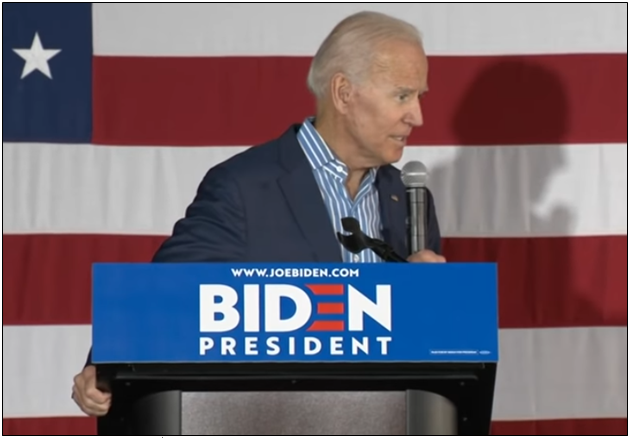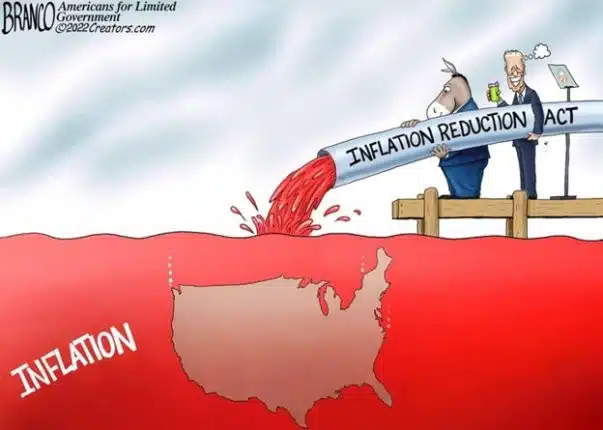Political parties pushing sovereignty first policies did remarkably well in European Parliament elections in the UK, France and Italy in May as nations feel increasingly overregulated and held back by the European Union. It is the latest instance of the struggle between nation-states and the global institutions that seek to control them and their destinies.
And it could serve as a bellwether for the U.S. election across the pond in 2020, where President Donald Trump lines up his America first reelection bid and Democratic frontrunner Joe Biden runs for President of the World.
In a fundraising call in April, Biden claimed, “I get calls from people all over the world — world leaders are calling me — and they’re almost begging me to do this, to save the country, save the world.”
“Save the world”? From what, America? His opponent is the sitting President of the United States, not some third world actor. And yet, Biden’s ill-advised remarks in many way represent the same local establishments that oppose country-first policies in many European countries — and now voters are striking back at the ballot box.
In the UK, the Brexit Party, founded weeks before the European Parliament elections, secured 30.5 percent of the vote, or about 5.25 million, with the Liberal Democrats in second place at 19.6 percent, or 3.37 million. The Labor Party was a distant third at 13.6 percent, and the Conservatives came in fifth place 8.8 percent.
Surely the humiliation of the Tories was anticipated by outgoing Prime Minister Theresa May, who announced her resignation on May 24 effective in June just hours after voting had taken place but a full day before the results were announced. The result was a referendum against May’s failure to follow through on the 2016 UK referendum in favor of Brexit after three years.
In fact, if Brexit had been finalized and left the European Union, the UK would not have even participated in the European elections. Instead, the UK has languished in a purgatory of sorts, neither a full member nor a separate actor.
Elsewhere, in France, Marine Le Pen’s National Rally Party narrowly beat Emmanuel Macron’s centrist alliance, 23.3 percent to 22.4 percent. Although it was more of a moral victory for Le Pen, as the majority of voters still chose pro-EU parties, it was still significant as it captured the growing dissatisfaction with the EU.
In Italy, Matteo Salvini’s League Party won decisively with 34.3 percent of the vote compared to the second place Democrats at 22.7 percent. A distant third was Luigi Di Maio’s Five Star Movement that won 17.1 percent. Forza Italia, led by Silvio Berlusconi, garnered 8.8 percent.
In Italy, the League and Five Stars currently partner in the government, meaning 51.4 percent of voters had affirmed the Italy first result of the 2018 elections. Both parties had run against EU controls on Italy’s ability to deficit spend. In 2018, Five Star had run on a €250 billion debt forgiveness plan, which helped it win the largest share of votes. Salvini wisely partnered with the Five Stars at the time, breaking with Berlusconi and setting Italy on a new path forward.
In the process, it appears Salvini has eaten significantly into the Five Stars share of the vote. If this had been the general election, Salvini could have partnered with Forza Italia and the Brothers of Italy, which garnered 6.5 percent, to nearly achieve a majority. The center right coalition’s ongoing success in regional elections in 2019, ousting Democratic regional governors, demonstrates a distinct turn in that direction.
All told, it makes Salvini the most powerful man in Italy, having not one, but two potential routes to forming a government after the next set of elections. The question is whether the Five Stars would still want to come along for the ride after contentious elections if Salvini emerged as the leader. But if the policy remains Italy first that reckons with European Union budget controls and perhaps even the Euro currency, the coalition could hold together. Salvini is still serving as Deputy Prime Minister with the Five Stars in government. They still agree on big issues.
What it means is that, at least in the UK and Italy, voters are holding together in reaffirming their sovereignty first platforms. The results, Brexit in 2016, the League and Five Star rising in 2018, were all statements against globalism, precisely the same populism that propelled Trump to power in 2016.
When Trump stands for reelection in 2020, perhaps against Biden, it will surely be another referendum on globalism. The President will see to that with his trade standoff with China.
In an inexplicable statement of affairs with China, Biden at a campaign rally downplayed the threat posed by Beijing, saying, “China is going to eat our lunch? Come on, man…they can’t even figure out how to deal with the fact that they have this great division between the China Sea and the mountains in the east, I mean in the west… they can’t figure out how they’re going to deal with the corruption that exists within the system. I mean, you know, they’re not bad folks, folks. But guess what, they’re not, they’re not competition for us.”
“Not competition”? Who is Biden kidding? China was granted permanent normal trade relations in 2000 and admitted to the World Trade Organization in 2001. U.S. manufacturing market share has dropped from 13.4 percent to 7.5 percent in 2017, according to World Bank data. China has risen from 5.3 percent to 16.6 percent in 2017 as companies moved there, hollowing out the Rust Belt, although their percent of global manufacturing market share has peaked in 2015 at 18.8 percent.
Who knew Lunch Pail Joe was such a globalist? Look for Trump to capitalize on (and replay ad infinitum) Biden’s “not competition” statement in Pennsylvania, Michigan and Ohio and elsewhere across the heartland.
And it’s not just trade, but other issues like global climate change or global migration where Biden falls firmly in the camp of globalists.
This is a pitched battle for middle America as Trump seeks to consolidate his gains by making a bid to take back the House of Representatives. Trump’s key to victory will lay in keeping together (and expanding) the coalition of conservative and union households in the Rust Belt. These voters are a lot like those pulling the levers for Brexit, the League and Five Star in the UK and Italy.
It’s all the same message: Country first.
To capitalize on his 2016 success, Trump should continue to recognize the common goals of his diverse coalition and continue to tap into policies that favor national interest, economic growth and bringing jobs back to the U.S. and that test the political establishment in Washington, D.C. and other capitals around the world that will surely be seeking to oust him.
Robert Romano is the Vice President of Public Policy at Americans for Limited Government.







